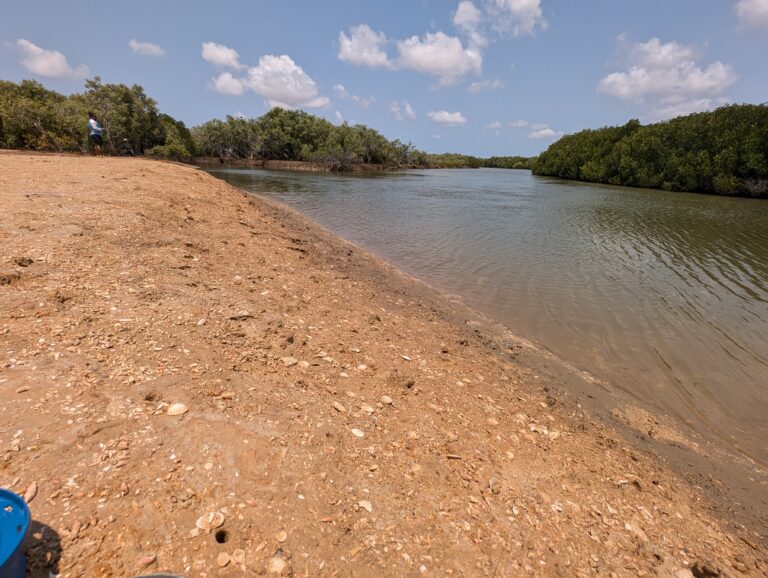
Campaign spotlight:
Mirndiyan Gununa Aboriginal Corporation
12 March 2025
Mornington Island (Gununa) is the largest of the Wellesley Islands. It has a permanent population of 1,200 and a cultural history stretching back thousands of years. Much of this history has been passed down the generations through songlines, stories, dance and Aboriginal Lore.
Mornington Island’s traditional owners, the Lardil people, have lived there for 8000 years. From the 1920s to the 1960s missionaries and government forcibly brought the Lardil, Yankgal, Kankalida, Waanyi and Kaidildt people onto the Island. This severely disrupted the cultural heritage and kinship system
Despite this, strong traditions, especially in visual and performing arts, have endured. Mirndiyan Gununa Aboriginal Corporation, where Young Offenders Support Service is based, is the island’s arts centre.
Violet Taulanga knows the Young Offenders Support Service (YOSS) is working because the kids show up.
“Before, when had to pick kids up for appointments or to do certain things, it was really hard. But now, when we pull up, they are waiting at the gate because they know we’re genuine, they know that we are turning up when we say we’re going to turn up and we’re going to help with what we said we’re going to help with.”
Violet and her son—both long-term Mornington Island residents—started the Young Offenders Support Service (YOSS) program at Mirndiyan Gununa Aboriginal Corporation on Mornington Island in August 2024.
For the past six months, they’ve been helping children aged 10 to 17 who have been involved in the youth justice system, get their lives back on track. Their rehabilitative program is deeply informed by their knowledge of community, and it’s far more effective than detention.
YOSS run a bush program, a hairdressing program, a family support program, and a life skills program. But the first thing Violet does is help her clients organise their finances.
“If they don’t have money, they’re going to commit criminal activities to get food,” Violet said.
“So, I thought, let’s just try and get down to the basics. And for me, that was income to be able to live.
“They were all entitled to Centrelink, but none of them had it because to get that, you need 100 points of ID and some hadn’t even had their births registered.
“It has taken quite a bit of time to get Centrelink for our clients, but what I’ve found is that they now feel they have more purpose in life. They’re not having to rely on other people and they’re starting to gain independence.”
After registering a client for Centrelink, Violet may help them set up a bank account, obtain a tax file number or write a resume. She hammers home the importance of saving and having a budget.
It’s clear this approach is helping to change lives.
“We did a school holiday food program where we were cooking meals three times a week for six weeks,” Violet said.
“One of our clients was employed to help run the program. And he was there consistently for all six weeks for all three sessions.
“The routine built up his confidence again, and he said, ‘Hey, I’ve got this opportunity, can you write me a resume? I’ve never had a resume in my life’.
“So we created his resume. He’s submitted that, and now he has a full-time job on the island.”
As news of the program grows, Violet is getting more and more inquiries.
“We’re finding a lot of (our client’s) friends and family members say, ‘Oh you helped my brother to get his driver’s license and a TFN and a resume – I’m kind of interested in that. Am I allowed to join your program or do I have to go to jail first?’
“And we say: ‘No, no, no, no, no, you do not have to go to jail first. We’re here for everyone. But you have to put in as much effort as well, okay?’The program is officially four days a week, but it will often operate an extra day because of demand.
Although it can be tricky, Violet is fuelled by hope. In less than a year, she has seen huge changes in her clients.
“This youth cohort will eventually become our adults and our leaders of our community. So what we’re trying to do is build them up into the best versions that they can be.”
As Queensland’s Youth Justice Peak Body, QATSICPP recently visited Mornington Island to meet with local elders, community members, and services like Mirndiyan Gununa Aboriginal Corporation. This visit showcased the incredible and life changing work being done in this community to support young people and families. As the Peak, QATSICPP advocates for evidence-based and systemic responses to children with justice involvement, drawing on the expertise and lived experiences of the community-controlled and youth justice sectors.
Queensland Council of Social Service (QCOSS) is the Peak’s service delivery partner, ensuring representation from across Queensland’s communities to meet the needs of all children and young people interacting with the youth justice system in Queensland. Both QATSICPP and QCOSS thank Mirndiyan Gununa Aboriginal Corporation for their valuable and ongoing work, which plays a critical role in empowering young people and helping them create pathways to positive futures. Their dedication is building trust and fostering lasting change in the lives of those they support.
Find out more about the Mirndiyan Gununa Aboriginal Corporation.
